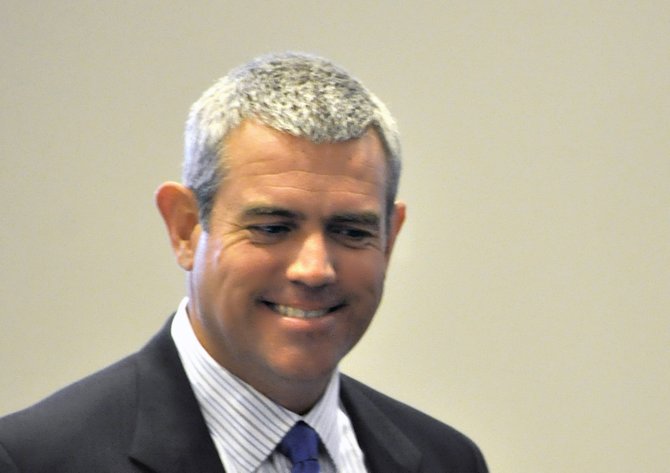Clues to why Speaker Philip Gunn backs raises for teachers might lie in Clinton Public Schools, located in Gunn’s district. Photo by Trip Burns.
Speaker Philip Gunn's vocal campaign for a teacher pay raise this year met widely with raised eyebrows, both among his fellow Republicans and his Democratic foes with whom he often spars. Yet, Gunn was the chief architect of pay-raise legislation in the form of House Bill 504, which passed overwhelmingly after exhaustive debate on the House floor last week. The bill would provide a $4,250 raise over four years and passed 85 to 26. Within seconds of the final vote, a press release arrived from Gunn's office stating: "I believe the measure we passed is a workable one for the Senate and the governor. You deserve a raise, and this is a big step in the right direction."
Public-education advocates argue that Mississippi's teachers are notoriously underpaid, making an average of $41,646 that lags every other state except for South Dakota. The politics under the Capitol dome remain murky. Twenty-two merit-payesque benchmarks that veteran teachers have to meet to get the raise may make it easier for Lt. Gov. Tate Reeves, who presides in the Senate, to swallow. Gov. Phil Bryant remains a wild card in the debate.
But why did Gunn do it? To get a better sense of Gunn's motivations, it takes looking outside of the statehouse and in his native Clinton. Gunn is not known as a friend to public schools, in large part because, during his two-year speakership, he has not seemed interested in budging on full funding of the state's funding formula known as the Mississippi Adequate Education Program.
Districts statewide have reported that The Great Recession, combined with MAEP underfunding, has wreaked havoc on their budgets, including staffing. The Clinton School District, one of the highest-performing in the state, has not been immune.
Sandi Beason, a spokeswoman for the district, said Clinton schools lost about 50 staff positions at the height of the recession in 2010. Some of those jobs came from attrition, not filling vacant slots, and about 25 were layoffs, Beason said.
"It was a rough time," Beason told the Jackson Free Press.
By all accounts, other districts have had a rougher time. A report from the Center for Education Innovation released in January showed Jackson Public Schools having a similar experience, shedding 90 jobs—50 of them teachers—in the past three years.
Democrats, who helped secure a $5,000 across-the-board raise last year unsuccessfully offered a similar bill to HB 504; Republicans argued that the Senate would not approve such a hefty sum.
Rep. Linda Whittington, D-Schlater, the amendment's sponsor, begged to differ. "Ladies and gentlemen, we do have the money. We do not have the political will," Whittington said.
FAQs on FQHCs
Republicans hate federal takeovers of health, but members of the Mississippi GOP love federally qualified health-care centers, or FQHCs. This week, the House voted 106 to 7 to pass House Bill 413, which would award $4.8 million in competitive grants so that FQHCs and rural health clinics around the state could improve access to primary care.
Democrats could not help but pounce on hypocrisy of taking $5 million out of the state treasury to improve health care when expanding Medicaid would cost state taxpayers nothing for two years and cover about 300,000 people.
"We're not discussing Medicaid," Rep. Sam Mims, R-McComb, snapped during a line of questioning from Jackson Democrat Rep. Cecil Brown.
By Brown's calculation, the grants would provide about $85,000 per year to each of the state's 21 FQHCs. Family Health Care Clinic Inc., headquartered in Pearl, own two of those clinics.
Back in 2011, two Mississippi congressmen—Sen. Thad Cochran and Rep. Gregg Harper—asked the U.S. Department of Health and Human Services to provide Capital Development Building Capacity Grants to Family Health Care Clinic Inc. Gov. Phil Bryant has also said he would like to provide more grants to federally qualified health centers as an alternative to Medicaid expansion, which he opposes.
Mims said the grants could enable clinics to expand their staffs or operating hours; Brown is doubtful the money will go very far: "If you vote for this (bill), don't tell people you've taken care of poor folks and their health-care needs."


